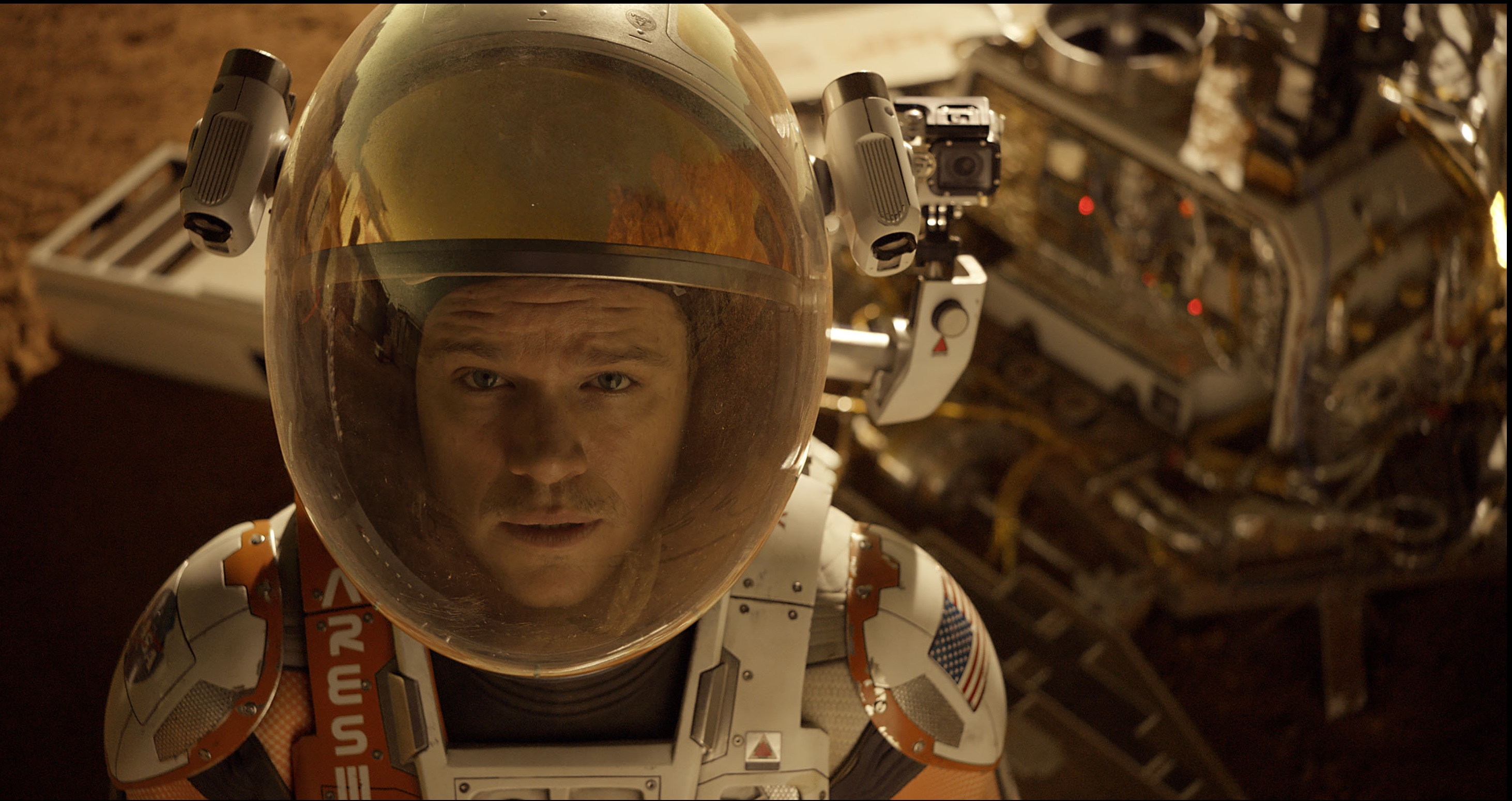 In the movie “The Martian,” Matt Damon’s character finds himself stranded alone on Mars. DePaul University researcher Suzanne Bell is studying how to best assemble teams for long-distance space expeditions. (Photo courtesy of Twentieth Century Fox)
In the movie “The Martian,” Matt Damon’s character finds himself stranded alone on Mars. DePaul University researcher Suzanne Bell is studying how to best assemble teams for long-distance space expeditions. (Photo courtesy of Twentieth Century Fox)Fictional astronauts coping with drama in deep space make for a great movie. In real life, researchers are helping NASA better understand behavioral and psychological issues that could arise on long-distance missions, like a potential human expedition to Mars.
DePaul University’s Suzanne Bell is working with a team to conduct research, funded by NASA, on how to assemble the best teams of astronauts for these missions. Bell, an associate professor and industrial and organizational psychologist, specializes in team composition and analyzes how factors like personality, age, skills and background can predict the success of a team. “I develop the science behind identifying the right mix of people for the situation,” said Bell. She has studied how teams interact in extreme conditions, like those deployed to Afghanistan, as well as in more traditional office environments.
Ahead of the release of the film “The Martian,” Bell is available for media interviews about how team composition could make or break a real trip to Mars. The film, starring Matt Damon, depicts an astronaut who has been separated from his team and is stranded on Mars. The drama centers on his quest to stay alive, as well as the efforts of his crew and mission control to bring him home. In this Q&A, Bell discusses her research and how the movies get it right (and wrong). Bell can be reached at SBELL11@depaul.edu.
Q. Matt Damon’s character in the movie “Interstellar” had a very different reaction to deep space travel than his character seems to in previews for “The Martian.” What did you think about how “Interstellar” showed team composition?
A. I liked it. I thought director Christopher Nolan’s interpretation of the psychological issues that could come up on long-duration space exploration was great. What do you do when a crew is living together in a small Mars habitat, and someone isn’t coping well? Which individuals should be sent on such an extreme mission, and how can we compose and support a crew so they are resilient and can face whatever challenges comes their way? These are some of the issues that the space agencies are interested in as they start to focus on deep space exploration.
Q. How are you studying team composition for a trip to Mars?
A. Starting in January of 2016, I will work with other researchers to collect data on different teams at NASA’s Johnson Space Center, in the Human Exploration Research Analog environment. Crews will live and work in an isolated, small environment. Crewmembers are specifically chosen to have characteristics that are astronaut-like: similar in age, intelligence and so on. These individuals complete mission-like tasks and challenges, and we can test predictions about how we expect composition to influence teams functioning in these environments.
We will also look at research on teams in environments that share at least some of the characteristics expected of long-duration space exploration. Examples include teams that winter-over in Antarctica, or teams in chamber simulations like Mars 500, where individuals live and work together in isolation and confinement for extended periods of time. We review data collected in these environments and collect our own data to test and inform our composition models.
Q. Why are space agencies such as NASA interested in research on team composition?
A. My research looks at how to compose teams to be more effective. Team composition is focused on how the combination of team members affects a team’s ability to get along, cope with challenges and perform well. Team composition is an important consideration for optimal performance in almost any team context, but the importance of team composition is heightened when you’re talking about the conditions expected for deep-space travel.
On a potential trip to Mars, six or so people will live and work together for almost three years in a very small space, isolated from other people and their loved ones. There will likely be communication delays with mission control of up to 20 minutes, requiring the crew to work fairly autonomously. The crew will have to work together as a team, but may have different priorities because of their professional backgrounds, individual and cultural value systems, and differences between space agency cultures. So, who those six people are becomes really important, not only in terms of them being technically adept and having good teamwork, but that they’re also the right combination of people in terms of skills, personality and values. Team composition research can inform staffing decisions, and once a crew is chosen, it can inform how a crew is trained and supported because of its unique needs.
 Suzanne Bell, associate professor of psychology at DePaul University, is working on research that could help NASA assemble the best possible teams for a trip to Mars. Bell is working with a team on NASA-funded research on team composition, and she can discuss how movies like “The Martian” portray team dynamics and challenges. (Photo courtesy of Suzanne Bell)
Suzanne Bell, associate professor of psychology at DePaul University, is working on research that could help NASA assemble the best possible teams for a trip to Mars. Bell is working with a team on NASA-funded research on team composition, and she can discuss how movies like “The Martian” portray team dynamics and challenges. (Photo courtesy of Suzanne Bell)
Q. What are some of the other conditions that would affect a team going to Mars?
A. The journey out to Mars certainly has logistical challenges, but I don’t think that will be the real challenge for the crew. After all, there have already been cosmonauts and astronauts who have been in space for more than the anticipated six-month transit time to Mars. But now picture getting to Mars or coming back from Mars. What a challenge! When space vehicles are launched from Earth there are hundreds of people working together for a successful launch. If you miss a launch window, you just wait for the next one. On Mars you will have the crew, mission control on a communication delay, and whatever technology support that’s been created. The crew will need to live and work well together. They will rely on each other for social support. In addition, all of a sudden, there will be slam shifts that will require the crew to come together and work seamlessly as a team, for landing on Mars, for launch back to Earth, for emergencies. Flawless coordination is a challenge for most teams, let alone a space crew that’s already been subjected to a year or so of less-than-ideal conditions. Interpersonal compatibility, coordination, a shared understanding of the situation will be critical for success, and are all things that are affected by a team’s composition.
Q. What do you find most exciting about this research?
A. Most of us have worked on a team that didn’t have the right expertise, or that had personalities that just didn’t click. On the flip side, most of us have worked on a team that seemed to be able handle anything that came its way, did a great job on its assigned task, and was a pleasure to be on. My research is about not leaving the success of the team up to chance or gut feelings. I develop the science behind identifying the right mix of people for the situation. If you have the right people in place, and give them at least some organizational support or resources, they will find a way to succeed. With the wrong people in place, it will always be an uphill battle trying to get them where they need to be.
I love composing teams for competitive advantage for any organization, but I’m really excited about our NASA-funded research. What our research team discovers and the algorithms we create for NASA can be used to make good staffing decisions. It can also help NASA understand where things are most likely to go wrong, and might need extra intervention, for any crew that is sent on such a mission. Deep-space exploration will surely be challenging for any team, but my hope is for a Mars crew to return, stand arm in arm, and feel proud that they met all of those challenges as a team.
###
Source:
Suzanne Bell
SBELL11@depaul.edu
Media Contact:
Kristin Claes Mathews
kmathew5@depaul.edu
312-241-9856